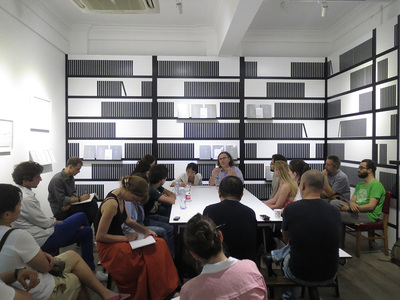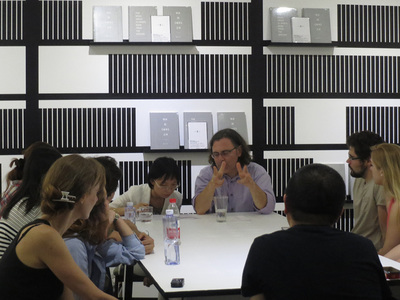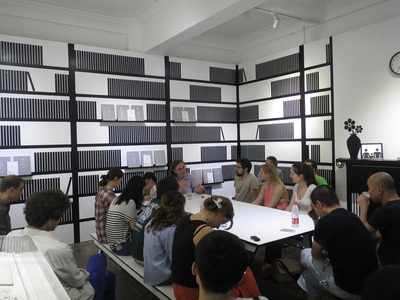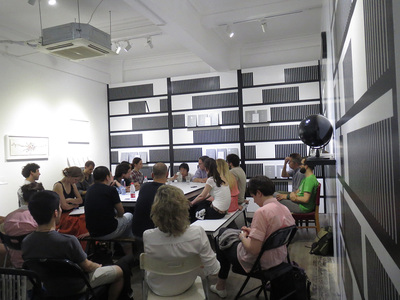USERSHIP - A Lecture by Stephen Wright
2013.05.28, 6:30 - 7:30pm.
Co-organized by Ecole Offshore
“Usership” has emerged as a powerful category of relationality over the past two decades in practically all sectors of society, not least of all that of art. It’s not that using words and tools by repurposing them is anything new but with the rise of networked culture, users have come to play a key role as producers of information, meaning and value, breaking down the long-standing opposition between consumption and production. Usership then has emerged as an unexpected alternative – one that is neither clear cut nor welcomed by all. For usership runs up against three stalwart conceptual edifices of the contemporary order: expert culture and other epistemocrats invariably depict users as misusers; spectatorship, for which usership is inherently opportunistic and fraught with self-interest; and most trenchantly of all, the expanding regime of ownership, which has sought to curtail long-standing rights of use. Yet usership is as tenacious as it is unruly. And the cultural sphere, too, has witnessed a shift away from pursuing art’s aesthetic function, and a growing sense of urgency to foster more robust use values. Users are neither owners, nor experts, nor spectators. Their outlook is that of radical pragmatism: they make use of what is available, in the here and now. As they ply the waters of opportunity — for theirs is a culture of opportunism, in a more positive sense of the term — they repurpose what is existent to their own ends.
Stephen Wright is a Paris-based art writer and professor of the practice of theory at the European School of Visual Arts. Over the past decade, his research has examined the ongoing usological turn in art-related practice, focusing on the shift from modernist categories of autonomy to an art on the 1:1 scale, premised on usership rather than spectatorship. A selection of his writing in English may be found on the collective blog n.e.w.s. In 2013, his Toward a Lexicon of Usership was published by the VanAbbe Museum.
《用户群——史蒂芬・怀特的讲座》
2014年5月28日,晚六点半至七点半
合作机构:离岸学院
“用户群”(usership)在过去的二十年间作为一种强大的关系性类别涌入社会的各个层面,尤其在艺术领域。通过使用文字和工具来重新目的化已经不再新奇,但随着互联网文化的兴起,用户开始扮演着更为重要的角色——信息、意图和价值的生产者,已然打破了长久以来在消费和生产之间的对立。“用户群”既而涌现为一种意料之外的选择——既不完全脱离但又不受欢迎的一类。只因其存在是对立于当代秩序的三座“大山”:“专家文化”及其它知识论专家总是将使用者的行为描述为滥用;“受众群”,对他们来说用户群是天生的机会主义者,并且往往从自身利益出发;最尖锐的是不断扩张的所有权体制,试图剥夺长久建立的使用权。然而,用户群的顽强一如其无从驾驭的特质。同时文化层面也在经历一种剧变,从追求艺术的美学功能,转为对其使用价值的渴求。使用者既不是拥有者,也不是专家,或观众。他们的观点基于彻底的实用主义:他们利用眼前可以利用的一切。他们侵淫于机会的潮水——因为他们信奉机会主义文化,用一种更为积极的术语来表述,即他们将所有存在于他们世界的事物重新目的化。
史蒂芬・怀特(Stephen Wright)是一位工作在巴黎的艺术类撰稿人,任教于欧洲视觉艺术学院(European School of Visual Arts)理论运用专业。在过去的十年间,他的研究针对艺术相关实践中持续变换的使用逻辑,基于使用群而非受众群为其前提。他的英语文章可见于集体博客n.e.w.s。2013年,他的文章Toward a Lexicon of Usership为VanAbbe美术馆出版。
2013.05.28, 6:30 - 7:30pm.
Co-organized by Ecole Offshore
“Usership” has emerged as a powerful category of relationality over the past two decades in practically all sectors of society, not least of all that of art. It’s not that using words and tools by repurposing them is anything new but with the rise of networked culture, users have come to play a key role as producers of information, meaning and value, breaking down the long-standing opposition between consumption and production. Usership then has emerged as an unexpected alternative – one that is neither clear cut nor welcomed by all. For usership runs up against three stalwart conceptual edifices of the contemporary order: expert culture and other epistemocrats invariably depict users as misusers; spectatorship, for which usership is inherently opportunistic and fraught with self-interest; and most trenchantly of all, the expanding regime of ownership, which has sought to curtail long-standing rights of use. Yet usership is as tenacious as it is unruly. And the cultural sphere, too, has witnessed a shift away from pursuing art’s aesthetic function, and a growing sense of urgency to foster more robust use values. Users are neither owners, nor experts, nor spectators. Their outlook is that of radical pragmatism: they make use of what is available, in the here and now. As they ply the waters of opportunity — for theirs is a culture of opportunism, in a more positive sense of the term — they repurpose what is existent to their own ends.
Stephen Wright is a Paris-based art writer and professor of the practice of theory at the European School of Visual Arts. Over the past decade, his research has examined the ongoing usological turn in art-related practice, focusing on the shift from modernist categories of autonomy to an art on the 1:1 scale, premised on usership rather than spectatorship. A selection of his writing in English may be found on the collective blog n.e.w.s. In 2013, his Toward a Lexicon of Usership was published by the VanAbbe Museum.
《用户群——史蒂芬・怀特的讲座》
2014年5月28日,晚六点半至七点半
合作机构:离岸学院
“用户群”(usership)在过去的二十年间作为一种强大的关系性类别涌入社会的各个层面,尤其在艺术领域。通过使用文字和工具来重新目的化已经不再新奇,但随着互联网文化的兴起,用户开始扮演着更为重要的角色——信息、意图和价值的生产者,已然打破了长久以来在消费和生产之间的对立。“用户群”既而涌现为一种意料之外的选择——既不完全脱离但又不受欢迎的一类。只因其存在是对立于当代秩序的三座“大山”:“专家文化”及其它知识论专家总是将使用者的行为描述为滥用;“受众群”,对他们来说用户群是天生的机会主义者,并且往往从自身利益出发;最尖锐的是不断扩张的所有权体制,试图剥夺长久建立的使用权。然而,用户群的顽强一如其无从驾驭的特质。同时文化层面也在经历一种剧变,从追求艺术的美学功能,转为对其使用价值的渴求。使用者既不是拥有者,也不是专家,或观众。他们的观点基于彻底的实用主义:他们利用眼前可以利用的一切。他们侵淫于机会的潮水——因为他们信奉机会主义文化,用一种更为积极的术语来表述,即他们将所有存在于他们世界的事物重新目的化。
史蒂芬・怀特(Stephen Wright)是一位工作在巴黎的艺术类撰稿人,任教于欧洲视觉艺术学院(European School of Visual Arts)理论运用专业。在过去的十年间,他的研究针对艺术相关实践中持续变换的使用逻辑,基于使用群而非受众群为其前提。他的英语文章可见于集体博客n.e.w.s。2013年,他的文章Toward a Lexicon of Usership为VanAbbe美术馆出版。





